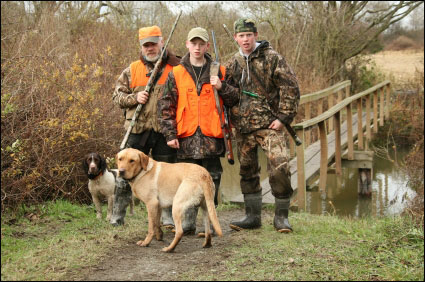A few years ago I experienced a moment that is now seared into my memory. The moment began inconspicuously. I and some of my Rocky Mountain Vintagers pals were ambling from station to station at Jerry William’s superb Quail Run Sporting Clays Club in Kiowa, Colorado.
At a station with two lazy straight-away targets, a dad was teaching his daughter to handle a shotgun. She was slender, about twelve and the pump shotgun her dad maneuvered to her shoulder seemed ponderous. I value dads teaching their children how to shoot so I slowed down to observe and listen to his words. “Keep your head down; lean forward, weight on front foot, watch for target over here….” The dad pointed to a thicket of bramble to their left.
Suddenly the young lady spun to her right, pointing the barrel toward her father and the walking path of the shooting course. As his left hand adroitly pushed the barrel toward the target area, the dad calmly said, “Honey, pay attention. Someone could get hurt.”
Observing that interaction affirmed, yet again, how the shotgun sports offer unique opportunities to teach shooting safety and also teach broader lessons about ethics that reach beyond the shooting sports.
Almost all the clay target shooting I’ve done has been with only one other person, most often one of my children, or in small groups, mostly in a squad of two or three.
A dominant characteristic of those small groups is trust, and, with my family, there is the added characteristic of love. Those small groups—you can call them audiences—create an intimate and trusting environment that can be superior to other formats for teaching the complex ideas and analyses inherent in proper shooting, specifically, and in living a proper life, generally.
I share three ways that a parent or other mentors can maximize the opportunity to teach ethics by taking advantage of the natural intimacy of the small audience one generally finds in shotgun target shooting and hunting.
- The Intimate Audience Better Enables a Dialogue
Good company and good conversation are the very sinews of virtue.
Izaak Walton, The Compleat Angler, 1653
I find it easier to talk, to understand and to be understood when conversing with one person or in a small group. I need time to effectively explain issues and time to think about people’s comments. Small groups facilitate those processes. Talking to your child, one-on-one, as did the dad mentioned earlier, is a more efficient way of conveying moral concepts than, for example, by giving lectures to entire football or soccer teams.
The most effective way to teach is through dialogue, and the intimate group offers the superior forum for having a meaningful dialogue. The word “dialogue” derives from the Greek dia and logos, meaning thoughts running through. A dialogue is a shared journey of questions and answers that addresses and analyzes issues and identifies the values inherent in those issues. A dialogue is a deliberation process of rational inquiry where questions and answers guide toward education, insight and self-awareness.
For the rest of the story, visit https://www.shotgunlife.com/kwka

